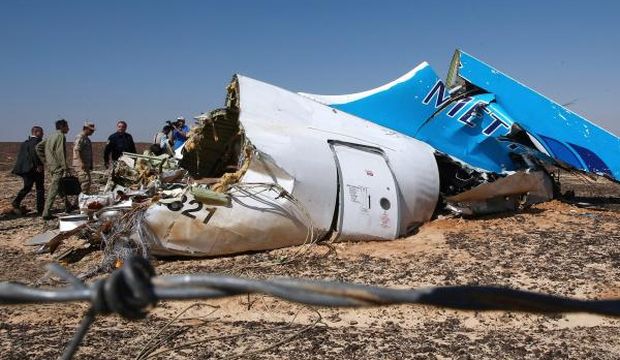
A handout picture provided by the Russian Emergency Ministry press service on November 2, 2015 shows Russian Emergency Situations Minister Vladimir Puchkov (4-L) and unidentified officials near a piece of wreckage of Russian MetroJet Airbus A321 at the site of the crash in Sinai, Egypt, on November 1, 2015. (EPA/Maxim Grigoriev/Russian Emergency Ministry/HO)
St. Petersburg and Cairo, AP/Asharq Al-Awsat—Mystery and confusion surrounded the final moments of a Russian jetliner that plummeted suddenly from high altitude to the Egyptian desert, killing all 224 people aboard. The airline on Monday ruled out pilot error or a technical fault, but Russian aviation officials dismissed those comments as premature.
Some aviation experts raised the possibility that a bomb on board the Metrojet Airbus A321-200 brought it down, while others cited an incident in 2001 when the aircraft grazed the runway with its tail while landing.
James Clapper, the US director of national intelligence, said that while there is no direct evidence of any terrorist involvement yet, it couldn’t be excluded that the plane was brought down by Islamic State of Iraq and Syria (ISIS) affiliates in the Sinai Peninsula.
Asked if a terrorist attack could be ruled out, President Vladimir Putin’s spokesman, Dmitry Peskov, said: “No versions could be excluded.”
Peskov praised the role of the Egyptian authorities in handling the investigation of the crash so far and said there would be more in-depth coordination between them and Russian aviation experts in the coming days.
Mohamed Rahma, spokesman for the Egyptian Civil Aviation Ministry, told Asharq Al-Awsat on Monday there was still no specific timeframe for announcing the results of the investigation.
He said the committee charged with looking into the incident could take “up to a year” to conclude its investigations.
The Metrojet was flying at 31,000 feet over the Sinai on Saturday when it crashed only 23 minutes after taking off from the Egyptian Red Sea resort of Sharm El-Sheikh for St. Petersburg with mostly Russian passengers.
Metrojet firmly denied that the crash could have been caused by either equipment failure or crew error.
“The only possible explanation could be an external impact on the airplane,” Metrojet’s deputy director Alexander Smirnov told a news conference in Moscow. When pressed for more details, Smirnov said he was not at liberty to discuss them because the investigation was ongoing.
Asked if the plane could have been brought down by a terrorist attack, he said only that “anything was possible.”
But Russia’s top aviation official, Alexander Neradko, dismissed the company’s statement as premature and unfounded.
In televised comments from Egypt, Neradko said it would be possible to draw conclusions about the crash only after experts examined the plane’s flight data and cockpit voice recorders and studied the wreckage.
He said the large area where debris were scattered indicated the jet had broken up at high altitude, but he refrained from citing a reason for the crash pending the investigation.
Viktor Yung, another deputy director general of Metrojet, said the crew did not send a distress call and did not contact traffic controllers before the crash.
Experts say planes break up in flight usually due to one of three factors: a catastrophic weather event, a midair collision, or an external threat, such as a bomb or a missile.
A local affiliate of ISIS has claimed it brought down the aircraft, which crashed in the northern Sinai where the Egyptian military and security forces have battled militants for years. Both Egyptian and Russian officials have dismissed that claim as not credible.
Still, the US, Germany, and Britain all had overflight warnings in place for the Sinai. They advised airlines to avoid flying over the peninsula below 26,000 feet and to avoid the Sharm El-Sheik airport due to extremist violence and, notably, the use of anti-aircraft weapons.
Dubai’s Emirates Airline, German carrier Lufthansa, and Air France have all diverted their flights from Sinai Peninsula airspace. While Rahma said his country “could not force” any carrier to stick to their routes over Sinai, he added that “all the routes above Sinai remain open to all. They are safe and without problems.”
Robert Galan, a French aviation expert, said Metrojet’s claim of an “external impact” pointed to two possibilities: a bomb or sabotage.
“Either a bomb was placed during the stopover and programmed to explode after takeoff, or a mechanic sabotaged the plane,” he said. “These are the two most probable hypotheses.”
Sabotage would require familiarity with the electrical or fuel systems of the A321-200, but hiding a bomb would need less knowledge, he added.
Galan said an analysis of the plane’s data and voice recorders—the “black boxes”—will not confirm either a bomb or sabotage, as it records only the pilots’ communications and technical readings. But he said investigators could know within 48 hours whether a bomb downed the jet because the debris would show traces of explosives.
Speaking to Asharq Al-Awsat, Russian sources said they feared the incident could be the work of groups seeking to sabotage the relationship between Moscow and Cairo, which has warmed significantly since Abdel-Fattah El-Sisi’s rise to power.
“It is in the interests of some neighboring countries and organizations that the good relations between the two countries do not progress, especially during this current time when relations between various countries in the region are becoming adversarial and complex,” a source, who requested anonymity, said.
The plane’s operator has a spotty safety record and was rebranded recently in the wake of another deadly accident. The airline, registered as Kogalymavia, changed its trade name to Metrojet after one of its Tu-154 jetliners caught fire in 2011 while taxiing before takeoff, killing three people and injuring more than 40 others.
The Airbus A321-200 that crashed Saturday was built more than 18 years ago and changed several operators before entering Metrojet’s fleet in 2012.
